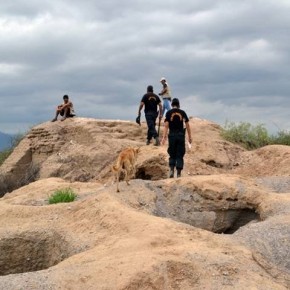Last night I was working on a short definition of the term “huaquero”. This is a seemingly easy task. The shortest definition is, of course is “Quechua/South American Spanish for looter of archaeological sites”, but I think the origins of the term are interesting enough to warrant mention. Not here though: you all will have to wait on that.
Moving on from origins, I started thinking about the tone of the word. When translated into English the term “grave robber” is often used. “Looter” is too general since it pertains specifically to looting of ancient cultural objects, but I wonder, at least at some level, if “grave robber” isn’t quite right either. These days the term “huaquero” in newspapers and by academics is almost totally negative in the “grave robber” sense. Across the board bad press. However, there seems to be a very strong and not entirely negative folk mythology about huaqueros that I am finding really hard to capture in translation.
For the past century and before huaqueros were just a social reality on Peru’s north coast. Good or bad, looting was profitable when nothing else was and thus it was something people did. I think this has caused a sort of gritty romantic image of the huaquero in the public conciousness. I will go out on a limb and assert that the term itself might just create a complete image of a person in Peruvian minds with clear ideas of race, culture, and class. Basically, I wonder if, at least historically, “huaquero” brings up the image of an iconic, stereotypical cholo from the North Coast.
This odd romance is, perhaps, best demonstrated in the song El Huaquero by Miguel Paz, a marinera norteña which seems to date from around or before the 1940s(???)
My translation of the lyrics:
I am the old grave robber (huaquero)
and I have come to loot pottery (huacos)
from the highest ancient mound (huaca)
to the lowest to the lowest ancient mound (huaca)
I had a cholia (female cholo in this context)
Who was called Jacoba
And every night
The Barbacoba bird called
Huaquero huaquero
Huaquero, were are going to loot (verb: huaquear)
Coba coba coba at dawn
Coba coba coba at dusk
Did I just totally blow your mind out of the water? Well brace yourselves for this: El Huaquero as performed by Peruvian kindergardeners:
YES! The little boy playing The Huaquero Viejo is holding a “looted” ceramic vessel!!
Now, I don’t know about your kindergarden experience, but I was never taught to sing songs about grave robbing, except in a freak-the-kids-out-at-Halloween context. Grave robbing wasn’t something to happily dance about.
All in all, I really don’t think we have a good translation of “huaquero”. Yes it gets more pejorative as time passes, but will it ever totally lose this cultural context? I hope not. We don’t want to forget the creation of a western market for these objects and the resulting free-for-all that brought people on the North Coast to, well, grave rob to such an extent that kindergardeners now sing about it. Yes make the term negative now, but don’t lose the historical scope.
If anyone has any good references on the social and cultural use of the term “huaquero” in either Spanish or English, send them to me!
